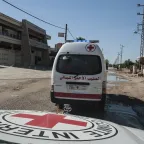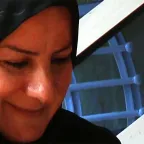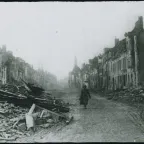Niger: Helping migrants in need
28-04-2014 …
28-04-2014 …
Following the ICRC's Global Partnerships for Impact and Innovation (GPHI2) event in Lausanne, the ICRC and Novartis launched a partnership, focusing on improving care and treatment to the most …

This humanitarian action webcast, co-produced by the ICRC and the Advanced Training Program on Humanitarian Action (ATHA), explores contemporary technological developments and discusses the resulting …
This humanitarian action webcast, co-produced by the ICRC and the Advanced Training Program on Humanitarian Action (ATHA), explores contemporary technological developments and discusses the resulting …
Huda is the mother of three children. The death of her husband left her destitute, but now she has opened a hairdressing salon with the help of the ICRC. Her new business is helping her support her …

He went to fight for an armed group as a boy; she thought he was dead. More than 10 years later, in prison, he told his story to an ICRC delegate and asked him to trace his family. The painstaking …

A town in ruins. There was massive destruction of civilian property: houses, factories, fields, villages – sometimes even whole towns – were obliterated. The catastrophic results for civilians …

Losing a foot to an explosive device could have shattered the dreams of Holmes, a young man from Caquetá department in southern Colombia. But today he’s studying at university and making a go of his …

On April 10th 2014, the American Society of Internaitonal Law and the International Law Association organized a joint Conference in Washington DC on autonomous weaponry and armed conflict. The panel …
This video tells the story of a woman who was a victim of sexual violence in Nariño department, one of the regions of Colombia where the armed conflict has taken its heaviest toll. In 2013, the ICRC …
Try one of the following resources:
Created in 1863, the ICRC library, alongside the ICRC archives, provides an indispensable documentary reference on the organization itself and international humanitarian law.
International humanitarian law is based on a number of treaties, in particular the Geneva Conventions of 1949 and their Additional Protocols, and a series of other instruments.
Customary international humanitarian law consists of rules that come from "a general practice accepted as law" and that exist independent of treaty law.